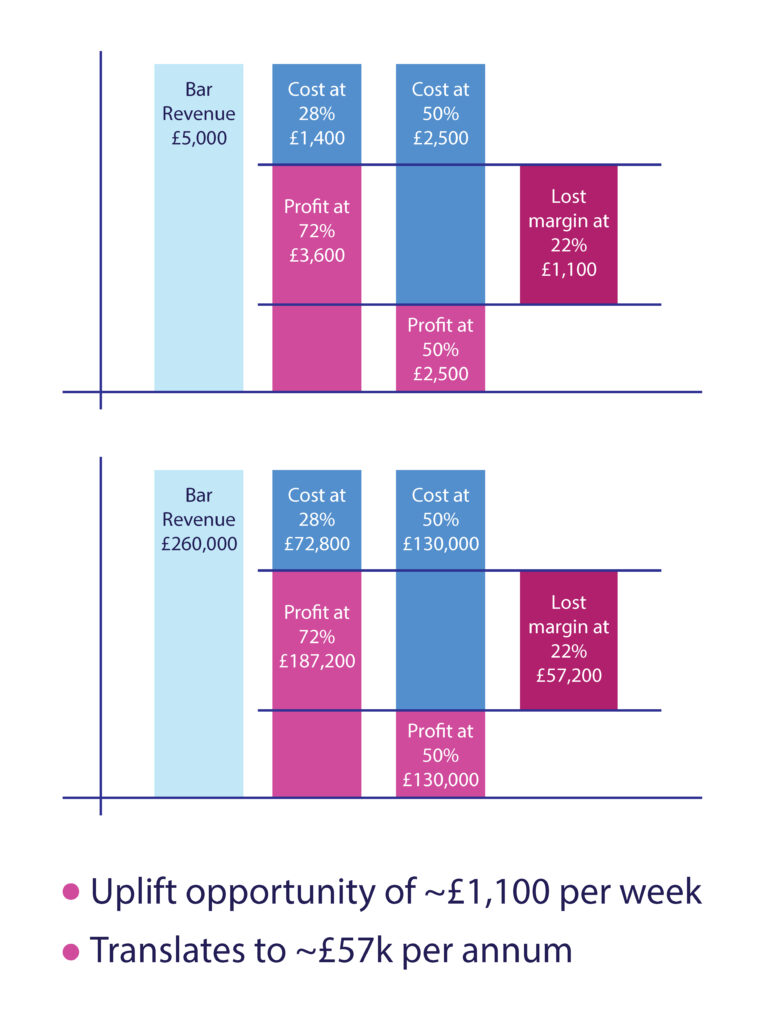Stock Taking vs. Stock Counting: Understanding the Difference
Stock taking is a comprehensive, periodic process that provides a full assessment of what is available in your business. This should be done on a weekly basis, serves as an official record of inventory levels, and allows business owners to know and understand their gross profit margin on food and drink.
Stock counting is what many businesses do. They keep a record of the count of stock, potentially using it to know what stock to order. But aside from this, the count is done just to count and not logged onto a stock management system, not tracked against sales, with little understanding of any results, gross profit margins, or what they mean. On the other hand, Stock Taking is a more frequent, ongoing process that ensures day-to-day stock accuracy. It helps identify discrepancies early, allowing businesses to react swiftly to losses, wastage, or theft before they become significant issues.
It is essential to understand the difference and well-managed stock taking should be an ultimate goal of every hospitality business. Understanding this can unlock key business benefits that drive profitability in bar-food margin.
Why Bar Margin Matters Most
Gross profit (GP) margin sits at the core of effective stock control and is one of the most essential financial metrics for any bar or food-led operation to understand. Stock taking isn’t just about knowing what’s on your shelves, it is about understanding what it costs you, what it returns, and how efficiently your operation is running.
Regular and accurate stock takes enable you to calculate your actual margins, compare them with your theoretical targets, and pinpoint exactly where profit is being lost, whether through over-pouring, wastage, theft, or poor pricing strategy. For instance, a venue operating at a 40% GP margin instead of a 70% target could be losing £300 for every £1,000 of net sales, which over time adds up to a significant dent in profitability.
Understanding and managing your bar margin gives you full control over your financial performance. It helps you make informed decisions on pricing, purchasing, portion control, and promotional strategy.
For example, a correctly poured pint (19 fl oz with a 15mm head) can return the equivalent of one extra pint for every 20 sold, highlighting how small adjustments in service can yield real financial gains. Postmix serves, when portioned with ice and garnish, can further enhance margin with minimal cost implications.
But none of this works without proper stock taking. This is where many businesses go wrong. They simply count stock without any wider process or purpose, often just to know what needs reordering. This kind of stock counting, while useful in the short term, is ultimately ineffective on its own. Without linking it to sales, purchases, and profit, it is just numbers on a page.
Every business should be stock taking, a structured, consistent approach that delivers insight, drives decision-making, and, most importantly, protects your margins.
Use these insights to protect your profits and ensure your business is not just busy, but truly profitable.
Why Proper Stock Taking Matters
Many hospitality businesses struggle with managing their inventory effectively, and this can lead to unnecessary financial losses. By implementing proper stock taking procedures, businesses can:
- Reduce Wastage: Wastage is one of the biggest hidden drains on profits. Whether it is food and beverage spoilage, overpouring at the bar, or inefficient portioning, tracking stock frequently helps pinpoint wasteful practices. With real-time insights, businesses can implement better controls to minimise waste.
- Identify Popular Products & Maximise Margins: Understanding which products sell the best allows businesses to improve pricing strategies and supplier negotiations. Stock taking ensures that best-selling items are always available while reducing the risk of overstocking slower-moving products. For example, a bar might discover that a particular brand of gin sells three times more than another, allowing them to negotiate better pricing or highlight it in promotions.
- Prevent Theft & Unauthorised Use: Theft is an unfortunate reality in many hospitality settings. Regular stock taking helps identify patterns of missing stock, whether due to internal theft or customer actions. If a bar notices that expensive spirits are consistently missing more than expected, they can investigate potential staff-related issues or tighten security measures.
- Improve Accuracy & Decision-Making: Having accurate stock data enables better business decisions. If a restaurant consistently runs out of a popular dish’s ingredients mid-week, proper stock taking can highlight the need to adjust order quantities. Similarly, bars can track pour rates to ensure drinks are served at the correct measures, protecting margins.
How Can Businesses Best Use Stock Data?
Stock taking is not just about numbers, it is about strategy. With accurate data, businesses can:
- Forecast demand to avoid stockouts and overstocking
- Adjust pricing and promotions based on real-time sales trends
- Identify supplier inconsistencies that impact product availability
- Plan menu changes based on high-margin, high-demand items
A fitting example of stock data in action is a project we undertook at Rossi Bar in Brighton. The bar significantly improved efficiency by implementing structured stock counting. By identifying high-wastage products, tracking missing stock, and adjusting purchasing patterns, they reduced unnecessary costs and improved profitability.
They can be improved immediately, and most businesses can get an immediate 5% uplift – with those with little to no stock control looking at uplifts of 20%.
Below is the example of financial impact of margin improvement:

How Easy Is This to Set Up and Get Right?
Many businesses hesitate to implement proper stock management processes due to concerns about complexity or time commitment. However, with the right processes and tools, it can be seamlessly integrated into daily operations.
Setting up proper stock taking involves:
- Training staff on best practices for managing, counting and recording stock
- Using digital stock management systems
- Scheduling weekly stock takes
- Implementing accountability measures to ensure accuracy
Once in place, stock taking becomes a simple yet powerful routine that helps businesses stay in control and improve their bottom line.
Let Us Handle It for You – The Experts in Stock Management
Managing stock effectively requires expertise, precision, and consistency. That is where we come in! We specialise in stock taking and management for hospitality businesses, ensuring accuracy, reducing wastage, and protecting your profits.
Don’t leave your business’s financial health to guesswork. Contact us today and let us implement a stock management system that works for you!

 " />
" />

 Instagram
Instagram Facebook
Facebook Linkedin
Linkedin